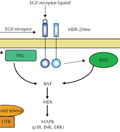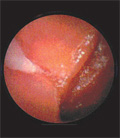The eLitMed.hu medical portal uses computer cookies for convenient operation. Detailed information can be found in the Cookie-policy.
Lege Artis Medicinae - 2005;15(01 klsz)
Content
[FROM ASPIRIN TO COXIBS - JANUS-FACE OF THE NONSTEROIDAL ANTI-INFLAMMATORY THERAPY]
[Since the introduction of aspirin nonsteroidal anti-inflammatory drugs (NSAIDs) proved to be the most commonly used drugs in the world. One of the major factors limiting their use is gastrointestinal toxicity. It has long been recognised that NSAID use is associated with serious, sometimes life-threatening adverse effects, like gastrointestinal ulcers, bleeding and perforation. Recent studies have indicated that the combination of NSAID and aspirin significantly increases the risk of complications. Aspirin is like a two-edged sword, balancing cardiovascular prevention with the risk of gastrointestinal side effects. Past history of ulcer carries the highest individual risk and other contributing factors include age, concurrent anticoagulation, cortocisteroid therapy, as well as high-dose or multipleforms of NSAID use. The mechanism of action of NSAID is to inhibit prostaglandin production through cyclooxygenase (COX). The inhibition of COX-2 isoenzyme reduces inflammatory-mediated prostaglandins, while the inhibition of COX-1 reduces the level of prostaglandins needed for normal protecting mechanism of the gastric mucosa. Non-selective NSAID has impact on both COX-enzymes, while selective COX-2-inhibitors (such as coxibs) exert their effects without affecting mucosal defence significantly. It is important to note that the risk of complications can not be reduced to zero by any therapeutic approach. The most appropriate treatment modality is to administer PPI co-therapy for the sake of gastro-protection, especially in high-risk cases. Histamine-2-receptor antagonists are not effective in reducing ulcer and complication in that particular group of patients. It has turned out that the inhibition of the synthesis of COX-2 by rofecoxib increases the risk of developing thromboembolic events and myocardial infaction. This has led to the withdrawal of Vioxx from the market on 30. 09. 2004. Studies conducted in recents years shed new light on numerous beneficial effects of NSAID other than alleviate pain, cure inflammatory processes and diminish higher temperature. The incidence of colon polyps and adenomas as well as cancers is reduced among people who are on maintanance NSAID therapy. The process of stone formation in the biliary tract is also reduced in patients who are on NSAID treatment. Development of Alzheimer's disease seems to be hindered, however, this finding can not yet be considered as evidence based.]
[NOVEL ASPECTS OF COX-2 SELECTIVE NON-STEROIDAL ANTI-INFLAMMATORY DRUG THERAPY]
[The cyclooxygenase (COX) metabolic pathway and prostaglandin production appear to play a causal role in the promotion and progression of human cancers. Recently COX-2 has received a great deal of interest since it is frequently overexpressed in a wide spectrum of cancers and precancerous lesions. Furthermore, elevated production of prostanoids (particularly PGE2) via COX-2 is associated with several pro-carcinogenic effects including increased proliferation, apoptosis resistance, tumor neoangiogenesis and invasiveness, host immunosuppression, and altered xenobiotic metabolism. Inhibitors of COX-1 and COX-2 (aspirin and most other nonsteroidal anti-inflammatory drugs) and of COX-2 alone (e.g. coxibs) have shown cancer preventive efficacy in epidemiological studies, experimental studies and in human clinical trials. Due to their improved side effect profile, COX-2 selective inhibitors appear to hold substantial promise for long-term administration in the setting of cancer prevention. Emerging data suggest that these agents may have potential in cancer treatment as well. In addition recent results indicate that COX-2 enzyme is also overexpressed in inflammatory processes of the central nervous system, e.g. in Alzheimer’s disease, so its suppression could offer a possible new therapeutic strategy even in the prevention and treatment of Alzheimer’s disease.]
[PHARMACEUTICAL PREVENTION OF THE UPPER GASTROINTESTINAL SIDE-EFFECTS OF NSAID THERAPY]
[Nonsteroidal anti-inflammatory drugs (NSAIDs) reduce pain and inflammation in patients with rheumatoid arthritis and osteoarthritis. However, they are also associated with a significant risk of gastrointestinal events with clinical and economic consequences. It is mandatory to rationalise the use of different NSAID treatment strategies in patients with varying degrees of gastrointestinal and cardiovascular risk. In patients for those aged <65 years with no previous gastrointestinal event and not concurrently on aspirin (low risk patients), the use of an NSAID should be considered as appropriate. For patients with a previous gastrointestinal event (high risk patients) or who concurrently received aspirin, an NSAID alone should be rated as inappropriate and either a coxib or selective cyclooxygenase-2 inhibitor, or an NSAID + proton pump inhibitor combination is considered as appropriate. Finally, for patients aged >65 years with a previous gastrointestinal event and on aspirin (patients with very high risk) a coxib in conjunction with a proton pump inhibitor is considered to be the best therapeutic strategy.]
[GASTROINTESTINAL COMPLICATIONS OF LOW-DOSE ASPIRIN TREATMENT]
[Since its synthesis more than 100 years ago aspirin has become one of the most successful drug. Low-dose, long-term aspirin therapy reduces the risk of myocardial infarction, the frequency of cerebral stroke and also reduces the mortality of peripheral arterial diseases and systemic embolisms. With aspirin therapy becoming more and more widespread current knowledge is also getting more concerned about the gastrointestinal risks and beneficial effects. Aspirin therapy causes gastrointestinal damages by the inhibition of endogenous prostaglandin synthesis. The ion trapping effect and the injury of mucosal barrier as well as the inhibition of platelet aggregation are also responsible for gastrointestinal damages. According to epidemiological studies lowdose aspirin treatment increases the risk of acute upper gastrointestinal bleeding by 1.5-2.0 fold. However, endoscopic studies indicate that gastroduodenal ulcers may develop even in 10 percent of cases on long term aspirin treatment, most frequently in a symptom-free form. Older age as well as Helicobacter pylori infection increase the risk of aspirin induced ulcers. Beside Helicobacter pylori eradication therapy, preventive proton-pump-inhibitor treatment and the widespread of new non-toxic aspirin derivates may decrease the risk of gastrointestinal complications. Capsule endoscopy also seems to be a promising diagnostic tool for detecting aspirin induced small bowel erosions and ulcers. Long-term aspirin treatment increases the risk of acute bleeding from large bowel diverticulas especially with non-steroidal anti-inflammatory drug co-therapy present. Long-term, low-dose aspirin treatment is a promising method for the chemoprevention of colorectal cancers.]
1.
Clinical Neuroscience
[Headache registry in Szeged: Experiences regarding to migraine patients]2.
Clinical Neuroscience
[The new target population of stroke awareness campaign: Kindergarten students ]3.
Clinical Neuroscience
Is there any difference in mortality rates of atrial fibrillation detected before or after ischemic stroke?4.
Clinical Neuroscience
Factors influencing the level of stigma in Parkinson’s disease in western Turkey5.
Clinical Neuroscience
[The effects of demographic and clinical factors on the severity of poststroke aphasia]1.
2.
Clinical Oncology
[Pancreatic cancer: ESMO Clinical Practice Guideline for diagnosis, treatment and follow-up]3.
Clinical Oncology
[Pharmacovigilance landscape – Lessons from the past and opportunities for future]4.
5.








